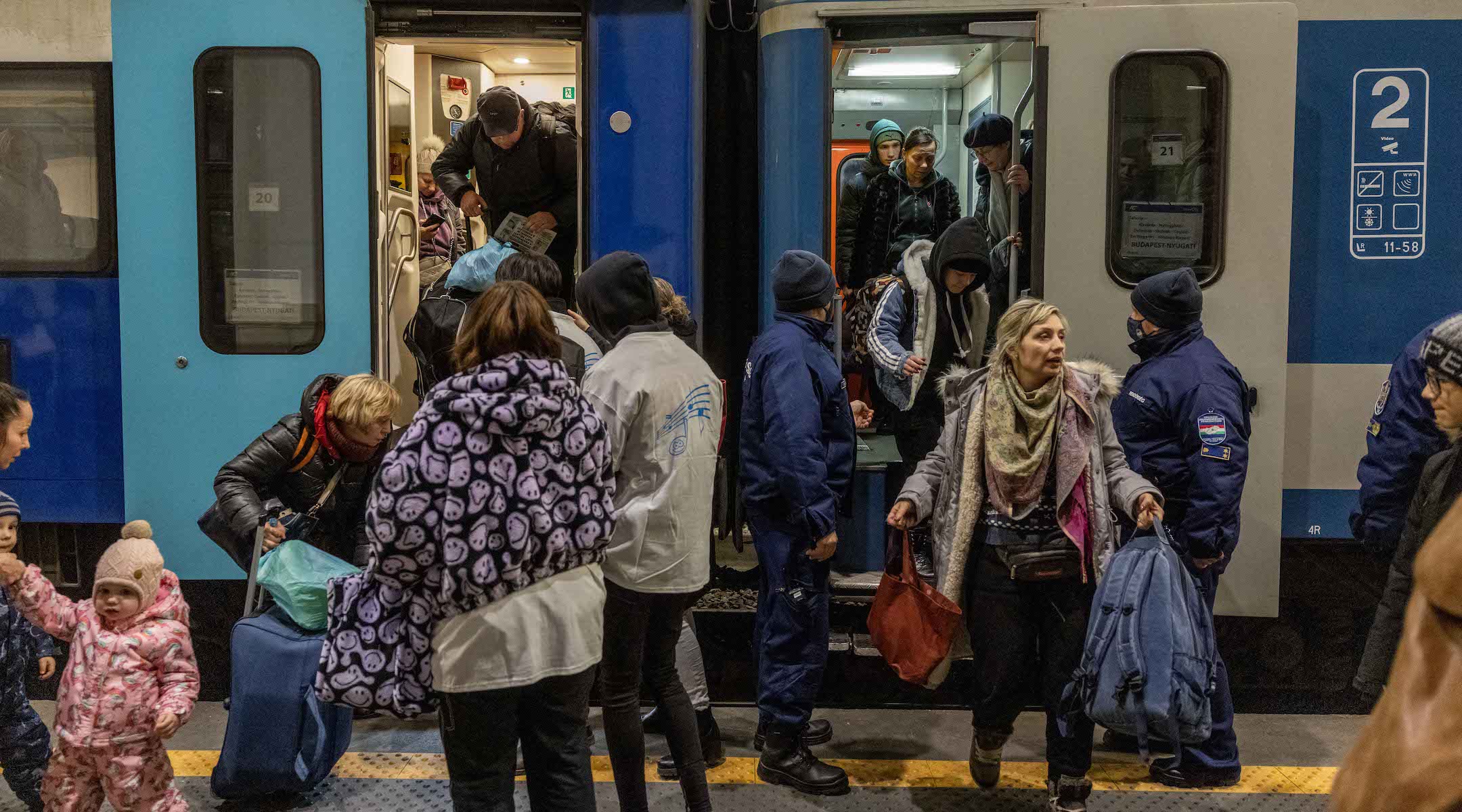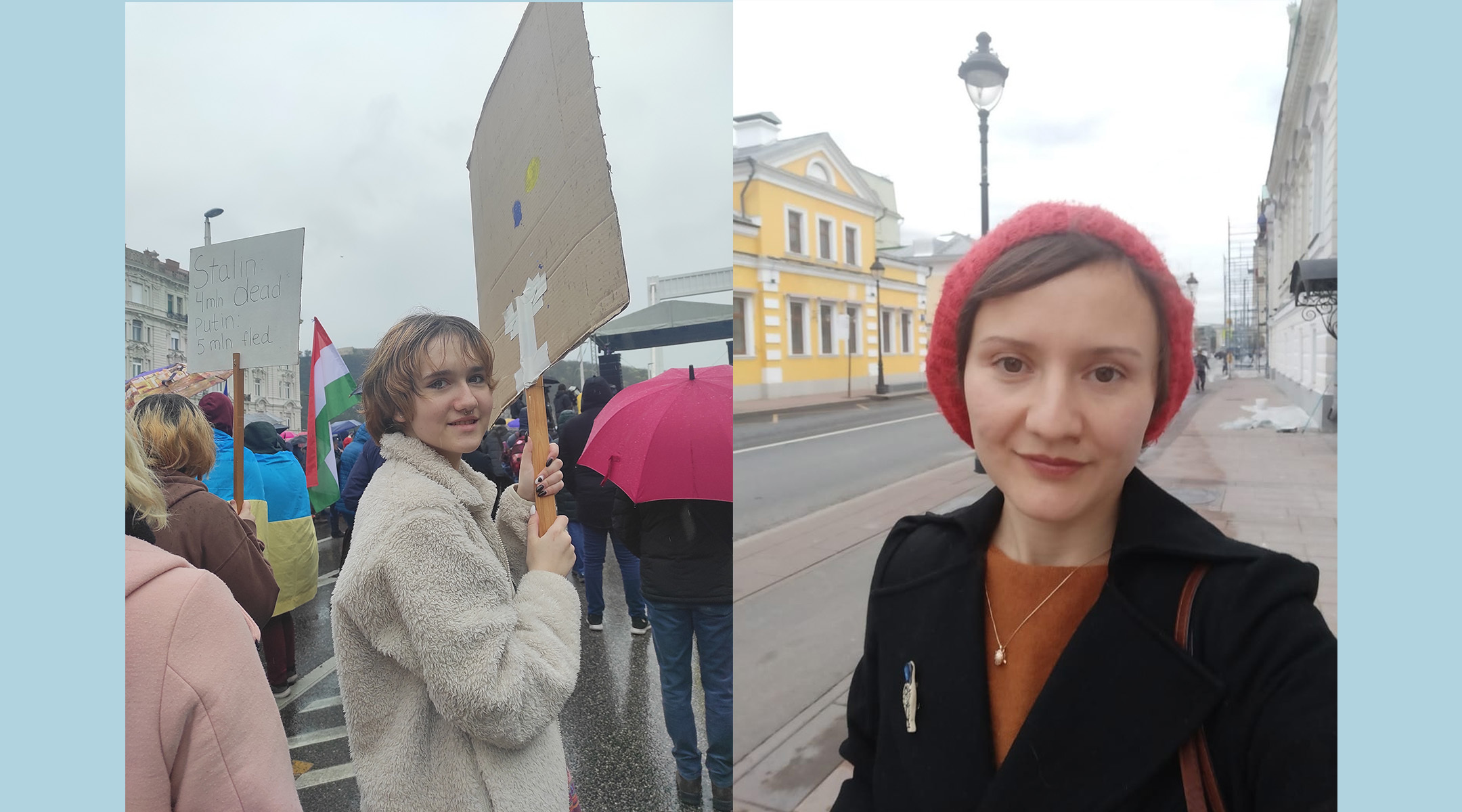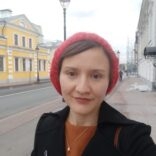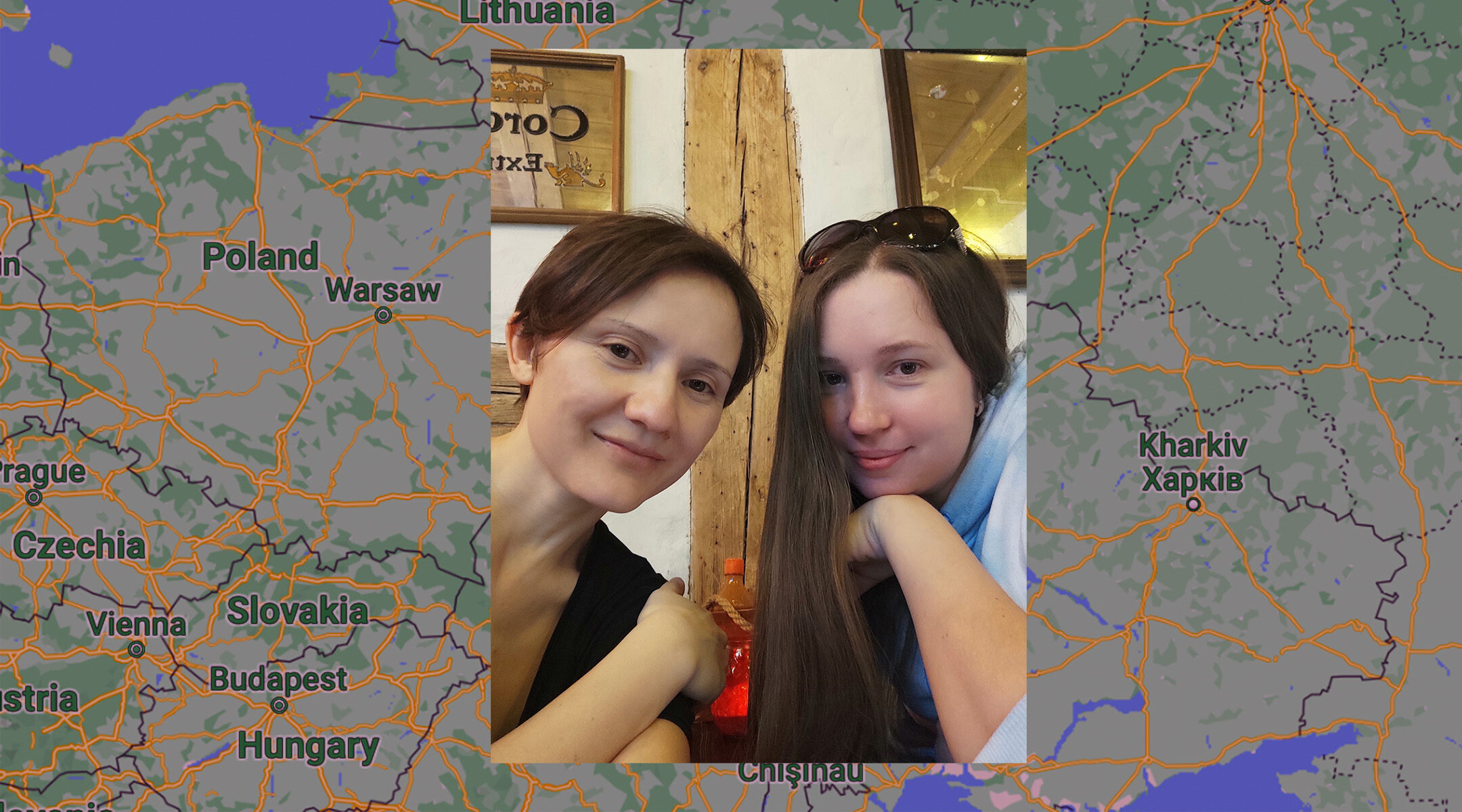BUDAPEST, Hungary (St. Louis Jewish Light via JTA) — It has been more than a month since I fled Russia with my two daughters, a cat and a dog. Like thousands of other Russians horrified by the senseless war in Ukraine, we left with few suitcases and no plan.
The decision to leave my country was excruciating. Our life in Moscow was full and happy. I had a job I loved as the Jewish community center’s creative director. My daughters — Varya, 14, and Katya, 12 — loved their school and the many friends they had there. Our cozy flat, with two balconies in the center of the city, was a cherished home. Why would I give all that up? Why would I leave everything I had worked for — and leave my father?
I am still coming to grips with the answer. All I know for sure is that I simply couldn’t stay in Moscow. The war against Ukraine, and the accompanying laws aimed at silencing all dissent, broke my relationship with Russia, perhaps forever. Day after day, I was hearing about friends being arrested for attending peaceful demonstrations. One friend was asked to leave her job after her boss found out that she had gone to a protest. A sociology professor from the university I attended was badly beaten by police for speaking out against the war.
I feared I could be next, or worse, my oldest daughter, who insisted we take to the streets and revolt. I had already signed a letter condemning the war. I had put up anti-war flyers on buildings in my district. I had posted unflattering comments about Vladimir Putin on social media.
At the same time, media from outside of Russia was being censored. People around me feared talking openly on the phone. I was seriously afraid of being cut off from the rest of the world, stuck behind a newly erected iron curtain. I started to feel claustrophobic in the biggest country in the world. I couldn’t sleep at night. In the day, it was literally hard to breathe.
Never miss a story. Sign up for JTA's Daily Briefing.
SUBSCRIBE HEREAll this to wage war against Ukraine, the place where my great-grandparents are buried and home to some of my dearest friends and colleagues. I spoke to the mother of one of those friends on Viber, a secure messaging app, as she hid in a bomb shelter. It was heartbreaking. I love Ukraine and I am ashamed that my country has caused so much pain and destruction.
This is why I decided to leave Russia, despite the many obstacles in my way.
As a result of Western sanctions, I was unable to use my credit card to buy airplane tickets, book a hotel or do much of anything that might help me escape Russia. International travel was mostly halted. Prices for flights that were taking off skyrocketed tenfold, with demand far exceeding supply.
I stayed online late into the night, desperately looking for tickets to take me anywhere, from Uzbekistan to Casablanca. My friends in Europe and the United States tried to help me, but their money couldn’t pay for flights that were no longer allowed to fly.
I decided I might have better luck speaking face-to-face with an airline ticket agent rather than on the phone. After a fruitless search to find tickets, the agent asked to speak to me privately, away from her colleagues. She told me how scared she was because of the war, how hard it was to see so many people trying to flee Russia. She told me how unbearable it was to watch other Russians living everyday life like nothing had happened. Then, she started to cry, and we hugged, two strangers united by fear.
My failed attempts to leave by air increased my anxiety enormously. I bought train tickets to St. Petersburg. From there, I would take a bus to Finland, Estonia or Latvia.
I discovered very quickly that all the bus tickets had been sold out for days. I decided to go to St. Petersburg anyway, figuring I would somehow find a way out, even if we had to walk. Maybe that sounds crazy, but I was in a state of panic. I was not willing to wait any longer on the chance that Russia might right itself. My kids’ futures, as well as my own, were at stake.

Refugees fleeing Ukraine arrive at the Western Railway Station in Budapest, Hungary, March 9, 2022. (Janos Kummer/Getty Images)
With a rough plan in place, it was sad to think about leaving our pets. We have a lovely dog, a gift from my mom who died of cancer last summer, and a cat that my youngest daughter favors. Taking them was completely irrational, expensive and time-consuming, but I decided to do so anyway. It was especially difficult because my pets didn’t have international travel documents. Local veterinarians, seizing on an opportunity to make quick money, were charging a fortune for these papers. Still, I had to do my best to obtain them as soon as possible once we arrived in St. Petersburg.
I remember the last hours in my flat in Moscow. I was so tired. I just wanted to lie down on my bed under the blanket. It was three hours before the train departed. I looked around at my things — my bookshelves, a table, a favorite painting on the wall. They looked as they always had, like everything was still OK, still normal. I didn’t want to move.
We made it to St. Petersburg, staying just one night with a friend. I spent all my time perusing multiple Telegram channels (a broadcast messaging service), researching the best way to cross the border. We had a tourist visa, which wouldn’t get us very far. Because of COVID, there were special requirements to enter Finland or Estonia. The only avenues for entry were for work, to see relatives or to seek medical treatment. We met none of these requirements.
Luckily, I found a solution. I paid for a full night in a spa-hotel with a medical treatment package in Estonia. I also found someone to give us papers for our pets — at quadruple the typical cost. A taxi drove us to the border. We then crossed a bridge into Estonia by foot.
It was March 8, International Women’s Day, when we left Russia. It was cold and sunny. The sun was shining directly in front of us on our way to the border. I recalled the famous Pet Shop Boys’ song “Go West” as we journeyed.
The Russian border was no problem. The bridge between the two countries was beautiful. It was already dark and the medieval castle on the bank of Narva, a small Estonian town, looked like a fairy-tale fortress. The problem emerged on the Estonian side. It turned out it was not enough to have PCR-tests for my kids; border control requested full vaccinations for them. Somehow, I had missed this point among all the other requirements for entry.
The guards on duty were uncertain about what to do with us. We simply had to wait for what seemed like an eternity. Finally, an Estonian policeman stamped our passports. I was overjoyed and relieved. Like magic, the boulder that had been on my heart disappeared. We entered beautiful, peaceful Estonia, got a taxi to our hotel and, finally, slept. I didn’t wake up until the next afternoon.
We needed to get to Tallinn, Estonia’s capital, to catch a plane to Budapest where my close friend from childhood now lives. We could stay with her until I figured out our next steps. Friends in Kharkiv, Ukraine, despite being under shelling, found us accommodations in Tallinn. With the help of a local Chabad-Lubavitch community, we stayed in a hotel room on the banks of the Gulf of Finland for a few days. The first person we met there was a sweet little girl from Kiev who wanted to play with our dog. She was a refugee, displaced by Russian bombs. The encounter should have been carefree, but we couldn’t help worrying that she or her parents might respond to us angrily once they learned we are Russian.
It was clear that my daughter Varya needed to explain to this girl and others that not all Russians support Putin’s war. In the earliest days of the offensive, she spent time on TikTok searching for Ukrainian teenagers with whom she could communicate and explain our opposition. When we arrived in Estonia, she feared that everybody hated her because she was Russian. It was completely untrue. In Estonia, many people speak Russian as a first language. The same is true for Ukrainians. It was just her inner feeling of shame and responsibility that made her feel unwelcome.

Tatiana Glezer’s daughter Varya, 14, left, participates in a demonstrations supporting Ukrainians in Budapest. “I’m so proud of her,” writes Tatiana, right. (Courtesy)
I loved Estonia but was also happy to land in Budapest. My girls and I got to work immediately, volunteering at a local train station where most of the refugees arrived. My kids were looking for people coming from Ukraine, offering them snacks and water. I helped with translation and logistics. I was drawn to one woman who was in tears. She was with her two kids and a local volunteer. She told me that she was trying to get to Israel to be with an aunt but was turned back at the airport because her documents were incomplete. I was moved by her situation and wanted to help her. I took her to a Jewish agency at the train station. Volunteers got her to the consulate’s office and, four days later, she texted me that she and her kids made it to Israel.
Throughout this process, I have been reminded of Jews throughout Europe, generations before me, who also tried to flee their native country because of war and/or persecution. I think about the trauma that resulted when Jews weren’t able to escape the Holocaust. My friends and I were asking each other if “those” Jews felt the same. What was the last straw for them?
An uncle of my dad’s, Mikhail Agursky, was a famous dissident, a social and political activist. In 1975, he made aliyah and became a professor at Hebrew University in Jerusalem. In his autobiography, I read all about his suffering when he couldn’t leave Russia and felt blocked. I recalled him several times during the first days of Putin’s war.
We are among many Russians here volunteering to help Ukrainian refugees. I am doing what I can but also need to resolve my own situation. My tourist visa expires in June. I need to find a job or academic relocation (I also am a doctoral student). I am also mindful that leaving Russia has been hard on my girls. They need support. Recently, I found my youngest daughter crying on her bed. She told me she misses home and her friends. It broke my heart and made me question whether I have made the right decision leaving Russia.
Varya is already part of the vocal opposition. She has participated in the demonstrations supporting Ukrainians in Budapest. She and my friend’s kids have made anti-war posters, and Varya has been interviewed in English by Associated Press journalists. She even found a part-time job working as a barista. I am so proud of her. Thankfully, both of my girls can continue to study online at their Russian school. While not ideal, this works for now.
We are still with my childhood friend in Budapest. Of course, we can’t stay here forever. We need to find a home of our own, somewhere. A new friend in Hungary recently asked me if I have regrets. It took me only a second to reply that I do not. I know I could not survive in Russia any longer. If I stayed silent about the war, I would betray myself and die inside. If I spoke out, I could lose my job and likely face more severe consequences. Whatever new life I find for myself and my daughters, it has to be better than that.
A version of this essay originally appeared in the St. Louis Jewish Light. It is reprinted here with permission.
JTA has documented Jewish history in real-time for over a century. Keep our journalism strong by joining us in supporting independent, award-winning reporting.







